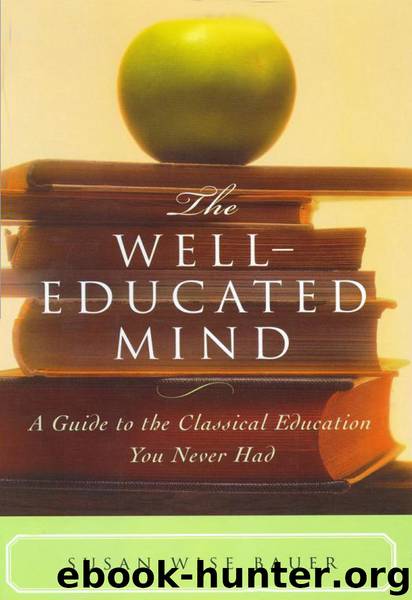The Well-Educated Mind by Susan Wise Bauer

Author:Susan Wise Bauer [Bauer, Susan Wise]
Language: eng
Format: epub
Publisher: W. W. Norton & Company
Published: 2003-08-10T16:00:00+00:00
Plutarch is the first biographer in the modern sense; he chronicles the life of men as men, rather than treating them as elements in a larger scheme of historical events. For Plutarch, the lives of great men are the larger scheme. History is formed by the famous, the powerful, and the privileged. Plutarch began a tradition of biographical writing that allowed Thomas Carlyle, hundreds of years later, to remark that “the history of what man has accomplished in this world, is at bottom the history of the Great Men who have worked here.”
As he writes, Plutarch links together the public accomplishments and private life of each of his subjects. “The most glorious exploits,” he writes, “do not always furnish us with the clearest discoveries of virtue or vice in men; sometimes a matter of less moment, an expression or a jest, informs us better of their character and inclinations.” Furthermore, the public and private are inextricably mixed; private life reveals character, and character determines the course of history. So we are told of Romulus’s great battles, but also of his supreme will to conquer, which made those battles into victories—a quality that led him, in his later years, to insist on being accompanied everywhere by young men who carried leather thongs, so that he could instantly command any bystander to be arrested and bound.
Plutarch tells the stories of Greek and Roman heroes in pairs, with an eye to similar virtues and vices. For Plutarch, history is a moral enterprise, and historical figures are models to be emulated or shunned. So in the pairing of Alcibiades (the Athenian hero) and Coriolanus (who later appears in a Shakespearian tragedy), we learn that Alcibiades was graceful and charming but warped by “ambitions and a desire of superiority,” and that Coriolanus had a “generous and worthy nature,” but due to a lack of early discipline was slave to “a haughty and imperious temper.” Both men had checkered careers because they were prone to being governed by their faults. But Plutarch gives Coriolanus the moral edge, since (bad temper notwithstanding) he was a straightforward and upright man, while Alcibiades was “the least scrupulous…of human beings.” Herein lies the lesson: A short fuse is a drawback, but unscrupulous behavior is a fatal flaw. These biographies are fables to guide moral development; as Plutarch himself writes, “The virtues of these great men…[serve] me as a sort of looking-glass, in which I may see how to adjust and adorn my own life.”
Download
This site does not store any files on its server. We only index and link to content provided by other sites. Please contact the content providers to delete copyright contents if any and email us, we'll remove relevant links or contents immediately.
The Art of Coaching Workbook by Elena Aguilar(51199)
Trainspotting by Irvine Welsh(21666)
Twilight of the Idols With the Antichrist and Ecce Homo by Friedrich Nietzsche(18632)
Fangirl by Rainbow Rowell(9251)
Periodization Training for Sports by Tudor Bompa(8273)
Change Your Questions, Change Your Life by Marilee Adams(7782)
This Is How You Lose Her by Junot Diaz(6887)
Asking the Right Questions: A Guide to Critical Thinking by M. Neil Browne & Stuart M. Keeley(5775)
Grit by Angela Duckworth(5615)
Red Sparrow by Jason Matthews(5473)
Paper Towns by Green John(5191)
Room 212 by Kate Stewart(5121)
Ken Follett - World without end by Ken Follett(4732)
Housekeeping by Marilynne Robinson(4447)
The Sports Rules Book by Human Kinetics(4387)
Papillon (English) by Henri Charrière(4274)
Double Down (Diary of a Wimpy Kid Book 11) by Jeff Kinney(4272)
The Motorcycle Diaries by Ernesto Che Guevara(4101)
Exercise Technique Manual for Resistance Training by National Strength & Conditioning Association(4071)
